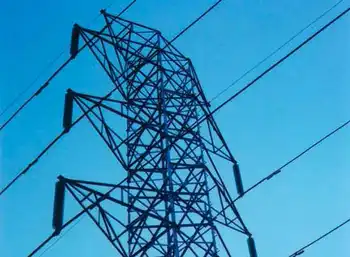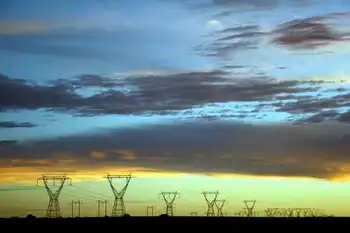Energy program stayed by TVA
By Knoxville News Sentinel
NFPA 70e Training
Our customized live online or in‑person group training can be delivered to your staff at your location.

- Live Online
- 6 hours Instructor-led
- Group Training Available
The news, which emerged from a TVA meeting with distributors in Nashville, came as a jolt to the state's solar industry, which has been flourishing under the program that, coupled with state and federal grants, has helped turn the otherwise cost-prohibitive technology into a reasonable investment. TVA said it is halting the program because of excessive demand.
Part of TVA's Green Power Switch program, Generation Partners pays a 12-cent-per-kilowatt-hour premium above the retail rate for solar power and a 3-cent-per-kilowatt-hour premium for other renewable energy, including wind and biomass. Through the incentive program, a customer with solar panels, for example, generates power that flows onto TVA's electric grid. The customer then receives credit for that power on each month's electric bill.
Last year, TVA expanded the incentives to include larger solar installations as well as biomass generation projects. The freeze does not impact current Generation Partners customers.
Ken Elder, owner of solar startup Soltility in Friendsville, said he learned of the freeze through an e-mail from another solar firm late June 16 and received an e-mail notification the following day from Nashville Electric Service. TVA did not issue formal information regarding the program until June 18.
"The folks that are working with me are just devastated because we are just really gearing up with potential customers," said Elder, who has been working as a consultant in the industry and is beginning to develop small commercial and residential projects on his own.
"TVA could do a lot of damage just studying this for six or eight weeks. Almost as bad as that, they could come back and say, 'We're going to re-implement the program, but it's not going to be at 12 cents per kilowatt hour, it's going to be 4 cents,' " Elder added.
Considered a pilot program by the federal power provider, Generation Partners is limited to a total of 200 megawatts of power generation and $50 million in total power purchased through the program.
An influx of applications following a recent change to the application procedure for the program resulted in the moratorium on new projects, said Susan Curtis, senior manager of TVA's Generation Partners program, via e-mail. The change allows projects to be approved prior to purchase and installation, "which allows financing for more customers," Curtis said.
"We received many more applications than anticipated in a short period of time. We did communicate with distributors as soon as we realized there was an issue and that it was escalating," she added. "We've always had open communications with distributors offering the program."
Locally, there are about a "half-dozen" solar projects in various stages of planning and construction, said Steve Noe, key account manager for KUB. Utility officials learned about TVA's decision at the Nashville meeting and had no prior indication there might not be room for all customers under the program's current structure.
"We didn't really know what was going on on TVA's side of that," Noe said. "I guess that's why it sort of came as a surprise to everybody."
Among those local projects are commercial and residential solar installations as well as government projects including a system for Knoxville's new transit center, a 500-solar panel project for the Knoxville Convention Center and a project pairing the city of Knoxville's Solar America Cities program with Knox Heritage to install solar as part of a local Victorian home rehab project.
"Our projects are kind of up in the air in that respect," said Susanna Bass, sustainability program manager for the city of Knoxville. "I'm not sitting on the panic button right now. Obviously, the sooner we know something the easier we breathe."
Also at stake is an expected bonanza of solar projects to be funded by the Tennessee Solar Institute at the University of Tennessee and funded with federal stimulus dollars. The institute is taking over a state-run grant program for solar and related clean energy projects, which recently received a tranche of federal stimulus money and will begin accepting grant applications.
"The danger is that the Department of Energy, which is funding the local programs is going to say, 'You're going to have to re-appropriate the money," said Gil Milear-Hough, Tennessee director of renewable programs for the Southern Alliance for Clean Energy who also works on contract as part of Knoxville's Solar Cities program. "When you say bad timing, DOE is saying we wanted this money spent yesterday."
For example, Bass said, while the deadline to spend all of the city's stimulus dollars is August 2011, she must spend 20 percent by Sept. 30 and 50 percent by June 30, 2011. So Bass is on the lookout for non-Generation Partners projects to help fulfill the earlier deadlines if needed.
"It's just too early to determine whether it's really going to affect our program," said Kimberly Holbrook, spokeswoman for the Solar Institute. "I think right now it's a developing story. Our goal is to facilitate the grant application process. That's going to be our immediate focus, and we're moving ahead with that."
Tennessee Solar Institute officials were not available for more detailed comment and officials with the Tennessee Department of Economic and Community Development did not return a call for comment.
Knoxville solar installation firm Efficient Energy of Tennessee already has broken ground on the state's first megawatt-sized solar installation and is preparing to hire 10 people to complete the project.
What was supposed to be a "good news" story for the company has become more of a nail-biter, said Harvey Abouelata, Efficient Energy's vice president of sales and marketing.
"It's already going, the train has left the station," Abouelata said of the project located on Andrew Johnson Highway. "This month was supposed to be whooping and hollering and celebrating.... I hope this is a blip on the radar."
The problem is not that TVA can't afford the initiative but simply that, as a pilot program, Generation Partners must operate within certain parameters, Milear-Hough said.
"It's largely an accounting problem," he said. "Every pilot has a $50 million cap. To go beyond that requires creating a program, and that does require a board action. But the board doesn't meet until August."
TVA is working to come up with both short-term and long-term solutions, according to the federal utility's statement. TVA's energy services committee will meet to discuss options, Noe said, and KUB has indicated it wants to be part of the process.
"The short-term changes will be announced this summer," Curtis said. "We do not know the time frame for the long-term changes and don't know what they will require."
Solar companies say they can't handle more than a few weeks of uncertainty.
"Nobody's going to be able to get financing or anything without the Generation Partners program," Abouelata said. "Small companies like ours, we can't survive six months of no business."











